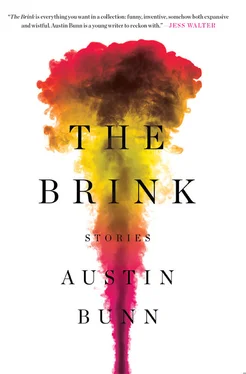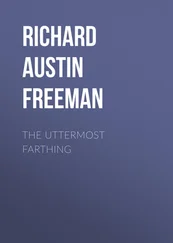“Have you been sexually active?” Dr. Stecopoulos asks.
“No,” I say. “She definitely has not.”
My mother remains quiet, staring up at the ceiling.
“Edith?” the doctor asks.
“Mom?” I ask.
She closes her eyes and sighs. “Yes,” she says.
The tiny door snaps off in my hand. “What? With who?” I ask.
“I don’t need to know that information,” Dr. Stecopoulos says. “But you will need to tell all your sexual partners.” He delivers this line as if it were plausible that my mother had a sexual partner. My mother is seventy-one. She is in menopause; there is no menoplay. Then he tells her she’ll need to apply a steroid cream to her labia — I see the zincky, frosted lips of skiers — and he writes her a prescription.
“With these steroids,” my mother asks, dressing, “will my labia become stronger?”
“Gross,” I say, and hand Dr. Stecopoulos the door to the uterus. It looks like the piece that covers a battery compartment on a remote, the part that inevitably breaks. “I think I messed up your model.”
Dr. Stecopoulos has no idea what I’m talking about.
“Your uterus,” I say. “I broke it.”
“Oh, that’s all right,” he says. “My uterus broke a long time ago.”
My mother pats his hand. “You’re not missing anything.”
In the car, my mother hunts desperately in her purse for Coffee Nips, as though she were the person I remember her being. “I need your support right now,” she says.
“Fine,” I say. “But I’m allowed to say, ‘Ew.’”
She closes her eyes, leans back against the headrest, and sucks on her candy with deep delight. She’s wearing the clip-on sunglasses I bought for her and a white sport fleece, collar up. I notice now that she got dressed up for the doctor visit in gold, drapey pants and sapphire blouse from Shine Daughters! — a fashion catalog she loves, even though it’s for African American women — on the off chance that Dr. Stecopoulos would run away with her. The poignancy of my mother’s life is that she still thinks people are looking at her, for guidance, for fashion tips. On her bureau, she keeps a framed photo of herself as a teenager in the Atlantic City parade: a red-haired mermaid on a papier-mâché splash, gazing upon the crowd with a royal look. When I was a girl, after she divorced my father and went feminist and vegetarian — Oh my God, the lentils, the antinuke walkabouts, the woven totes of my youth — I used to stare at that photo and wish for it to come alive, for her to invite me up onto the float. I ached to be her so badly I made her bookmarks with declarations of love. As a girl, I would watch her leave to go jogging, braless and single and alive, and wait patiently with her pack of cigarettes for when she returned.
Now she uses a cane, tucked next to her in the passenger seat; she’s used it irregularly since her foot surgery, and I know it humiliates her. Men seem almost regal with canes. But women are expected to keep their balance forever. Dime-sized freckles blot her skin, the star chart of her body gaining constellations yearly. A youth spent at the shore is catching up with my mother.
She smiles. This doctor visit has given her a sense of drama, an urgency that cuts a path through the hours. Other times, she can spend a day moving bills around.
“What are you looking at?” she asks.
“I’m trying to see you how your lover sees you,” I say.
“Oh, please.” She scratches at the corner of her mouth. “I’m starving, and I need my prescription.”
“I have to get home,” I say. “I have more people coming.”
“Good,” she says. “There’s a Quick Check near you.”
When my mother married my father, she was a good Catholic girl, a virgin. “Mistake number one,” she told me once. “I hadn’t even been down there yet.” She divorced my father thirty years ago, and somewhere in her apartment is a photo-album of all her boyfriends since: Val, the therapist; Devon, my elementary school teacher; and the ape with sideburns who worked in the anthropology department at the college. As we drive, I’m bothered, I realize, by the thought that someone finds my mother attractive. I feel excluded.
“It’s Al, isn’t it?” I say. Al, the retired ship’s captain, who wears blue khakis and a little anchor pin on his cardigan. Al, who plies her with highballs and Manhattans at dusk. He has furry Popeye forearms and a dimly lit Pacific backstory. I picture him on top of my mother, gritting his teeth and thrusting upward, like a ship cresting a wave.
“Wasn’t it funny how you broke the uterus?” my mother says.
“Just tell me if it’s Al,” I say.
She adjusts an air vent. “You should know that he is very gentle,” she says. “And appreciative. He understands a woman’s body.”
I shiver. My mother can’t bend over and instead has to spread her legs and squat. Her skin itches constantly, a side effect of her Parkinson’s medication. She keeps a back scratcher in her car and another, the telescoping kind, in her purse for emergencies. She can eat a half gallon of ice cream for dinner. People like her should not be having sex; sex is the reward for not eating a half gallon of ice cream.
“What’s your problem?” she says. “You want so badly to judge me.”
“I’m just surprised,” I say. “Surprised and worried about you.”
She gazes out the window as if she hasn’t heard me. “It’s not too late for you,” she says. “You’ve been separated from Scott for long enough. It’s time to meet new people.”
“I’m not ready.”
“What about that one I showed you?” she says. “The guy from the Internet?” She has taken to trolling the Craigslist personals for me, trying to matchmake. She’ll call and read me the postings: “He says he’ll be at the Harborside having a drink for the next hour. I’ll go by and check him out for you.” No! Or: “This one says he likes Bruce Springsteen.” We live in New Jersey; that’s redundant! She is unable to understand that Craigslist is where people sell their junk, including their personalities. No genuine, non-pot-smoking, non-gambling, non-fucking-a-twenty-five-year-old-teacher’s-aide-at-your-school man will let the universe know he’s having a drink at the Harborside. It’s an SOS from the bottom of the dating pool.
“There is no ‘guy from the Internet,’ and there will never be,” I say, my pronouncement punctuated by the speed bump at the entrance to my parking lot. Outside my garage, a man leans against the trunk of a Mercedes convertible. His legs are crossed, and while he talks on his cell phone, he digs at his molars with a pinkie. He’s dressed in the Manhattan palette: charcoal pants, a black short-sleeve dress shirt, and ribbony sandals that make his feet look bloodless. No wedding ring. I park and he finishes his call. “What about him?” my mother whispers as I bound out to meet him.
“You’re fifteen minutes late,” he says. “I thought you were going to be a no-show.”
“I’m sorry. My mother had a doctor’s appointment.”
“That’s me!” My mother waves the palm of the back scratcher from the passenger seat.
“I’m just here for the baby shit,” he says.
I throw open the garage door and point. The “baby shit” is in the back, where I could throw a blanket over it and pretend it was a mountain in the distance. I have a bassinet, baby chair, stroller, and play “environment.” When Scott and I were trying for kids, I made the mistake of accepting all of this from friends who had had their children, who were done having them. But I never got pregnant. Scott refused to get a fertility test because it was “annoying,” then “expensive,” then finally “against his religion,” the religion of morning bong loads, apparently. My fallopian tubes weren’t cooperating either; maybe they knew better. When I moved out, I wasn’t quite ready to see it all go, not because I hadn’t given up on kids — I’m fine, don’t pity me. My first night in the apartment, my mattress pinched at the back of the moving van, I laid out the play environment and fell asleep in it. I slept historically well.
Читать дальше











